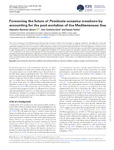Mostrar o rexistro simple do ítem
Foreseeing the Future of Posidonia Oceanica Meadows by Accounting for the Past Evolution of the Mediterranean Sea
| dc.contributor.author | Martínez-Abraín, Alejandro | |
| dc.contributor.author | Castejón-Silvo, I. | |
| dc.contributor.author | Roiloa, Sergio | |
| dc.date.accessioned | 2023-07-14T17:04:43Z | |
| dc.date.available | 2023-07-14T17:04:43Z | |
| dc.date.issued | 2022-12-01 | |
| dc.identifier.citation | Alejandro Martínez-Abraín and others, Foreseeing the future of Posidonia oceanica meadows by accounting for the past evolution of the Mediterranean Sea, ICES Journal of Marine Science, Volume 79, Issue 10, December 2022, Pages 2597–2599, https://doi.org/10.1093/icesjms/fsac212 | es_ES |
| dc.identifier.issn | 1095-9289 | |
| dc.identifier.uri | http://hdl.handle.net/2183/33324 | |
| dc.description.abstract | [Abstract] The current warming of the Mediterranean Sea has been forecast to lead to the shrinkage of seagrass meadows. We agree that rising sea temperatures most likely will have immediate negative effects on them because present-day asexually reproducing clones of Posidonia oceanica were likely selected as a form of resistance under suboptimal conditions during the colder temperatures of the last glaciation. However, since the evolution of P. oceanica has happened under tropical/subtropical conditions for tens of millions of years, some kind of evolutionary resilience to high temperatures is to be expected. We suggest that the ability of P. oceanica plants to reproduce sexually when water temperature is >27°C might lead in the future to the selection of warm-loving plants (as warm-sensitive clones decline), with an associated increase in genetic variability in the species gene pool. Predictions focused exclusively on the future decline of cold-selected (warm-sensitive) clones may result in short-sighted forecasts because the deep history of the taxon is overlooked. We suggest that an evolutionary-based approach should be more often considered when analysing the present declines of animal and plant species. We provide some additional examples of cases in which this could be done. | es_ES |
| dc.description.sponsorship | This work was supported by the Xunta de Galicia, project ED431C 2018/57 | es_ES |
| dc.description.sponsorship | Xunta de Galicia; ED431C 2018/57 | es_ES |
| dc.language.iso | eng | es_ES |
| dc.publisher | Oxford Academic | es_ES |
| dc.relation.uri | https://doi.org/10.1093/icesjms/fsac212 | es_ES |
| dc.rights | Atribución 4.0 Internacional | es_ES |
| dc.rights.uri | http://creativecommons.org/licenses/by/4.0/ | * |
| dc.subject | Posidonia oceanica | es_ES |
| dc.subject | Mediterranean Sea | es_ES |
| dc.subject | Seagrass meadows | es_ES |
| dc.subject | High temperature | es_ES |
| dc.subject | Evolutionary resilience | es_ES |
| dc.title | Foreseeing the Future of Posidonia Oceanica Meadows by Accounting for the Past Evolution of the Mediterranean Sea | es_ES |
| dc.type | info:eu-repo/semantics/article | es_ES |
| dc.rights.access | info:eu-repo/semantics/openAccess | es_ES |
| UDC.journalTitle | ICES Journal of Marine Science | es_ES |
| UDC.volume | 79 | es_ES |
| UDC.issue | 10 (December 2022) | es_ES |
| UDC.startPage | 2597 | es_ES |
| UDC.endPage | 2599 | es_ES |
| dc.identifier.doi | 10.1093/icesjms/fsac212 |
Ficheiros no ítem
Este ítem aparece na(s) seguinte(s) colección(s)
-
GI-GIBE - Artigos [74]
-
GI- BIOCOST - Artigos [45]






